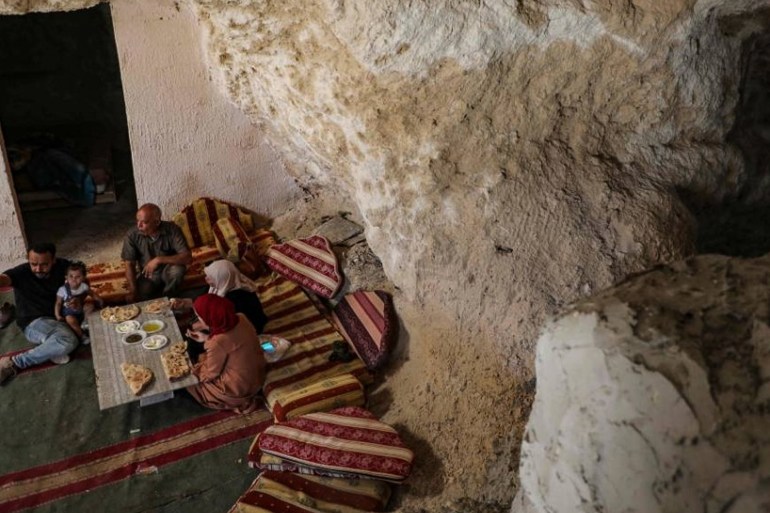Palestinian Ahmed Amarneh sought refuge in a cave at the foot of a mountain in the northern West Bank, to live in it with his family, after Israel prevented him from building a house in his village, Faraseen, which is under the Israeli security authority, but this shelter may not last.
Amarna, 30, closed the entrance to the cave with a wall of stones, put an iron door and another made of wood for it, and opened two windows, and inside he placed modest furniture. Amarna lives in the place with his pregnant wife and daughter, and next to the cave is a small barn for his sheep and chickens.
The family had been in the cave for a year and eight months, according to Amarneh, who added, "I was surprised by a warning from the Israeli authorities" in late July, calling for the cave located on his land to be removed within days.
The Israeli authorities often issue orders to destroy installations and buildings in the occupied West Bank, which they consider illegal. The warning that Amarna received coincided with 17 other warnings to demolish homes and facilities.
"I tried to build twice, but the occupation authorities told me that construction is forbidden in this area," said the architect, Ahmed Amarneh, to Agence France-Presse.
This prompted him to decide to live in a natural cave that has existed for a long time, considering that he does not need a permit to live in it, especially since the cave is located in a plot of land registered in his name.
Therefore, he is surprised at the request to remove the cave on the pretext that it was "constructed without a permit."
"The countries of the world do not expel even monsters from caves," he says. "I only ask to deal with us as if we are monsters, and not to expel us from them."
"I do not understand why they prevent me from living in a cave ... to deal with me like animals that live in caves if they are advocates of animal welfare."
Israeli bulldozers
The Coordination Unit for the Activities of the Israeli Government in the Palestinian Territories affiliated to the Israeli Ministry of Defense (COGAT) responded to the French News Agency's inquiries on the matter by saying that “the orders in the area (...) were given by the unit supervising buildings that were built illegally, without the necessary permits and approvals. ".
"The orders will be executed at the site in accordance with the authorities' procedures, and will be subject to operational priorities and considerations," she added.
The land on which the natural cave is located in the village of Farasin, which was recognized by the Palestinian Authority last March, belongs to a local authority, but the Israeli authorities deal with it as it deals with all areas under its administrative and security control in the West Bank.
Amarna said, holding his daughter in his hands, "I was surprised by the warning, because I had not built the cave that has existed since ancient times."
The family lives in anxiety, fearing the arrival of Israeli bulldozers to demolish the cave.
The Israeli "B'Tselem" organization says that Israel destroyed 63 Palestinian facilities in June, despite the outbreak of the new Corona virus, and amid tension resulting from the possibility that Israel would annex large parts of the West Bank and Israeli settlements there, in accordance with US President Donald Trump's peace plan. Between Israelis and Palestinians.
Israel prohibits Palestinians from building in areas under its security control known as Area "C", except in accordance with strict laws. Often Palestinians demolish their homes with their own hands, in order not to pay the cost of demolishing them if the Israeli authorities demolish them, if they were built without permits.
Farasin village is located in the northwest of the West Bank, and dates back to the year 1920. The head of the village council, Mahmoud Ahmed Nasser, told AFP that the village “was abandoned by the majority of its people in 1967, and some returned in 1980, bringing its population to 200 people living in separate areas. The vast area of the village, they do not form an interconnected village. "
There are no services in the village, and its homes are made of wooden panels or zinc, and there are no paved streets, no water service, or electricity.
Old houses
The water is pumped to the humble homes and herds of sheep from a large water tank that gets water from outside the village.
There are old houses at the foot of the mountain, to which the head of the council referred, saying, "Our people used to live there, and there are their graves."
On a hill near the village, a "caravan" can be seen, which Farasin residents say is a settler who recently arrived in the area.
"This settler came here a while ago with sheep," says the head of the village council, without anyone disturbing him. "At the same time, (the government) is asking us, the owners of these lands, to remove all aspects of life."

